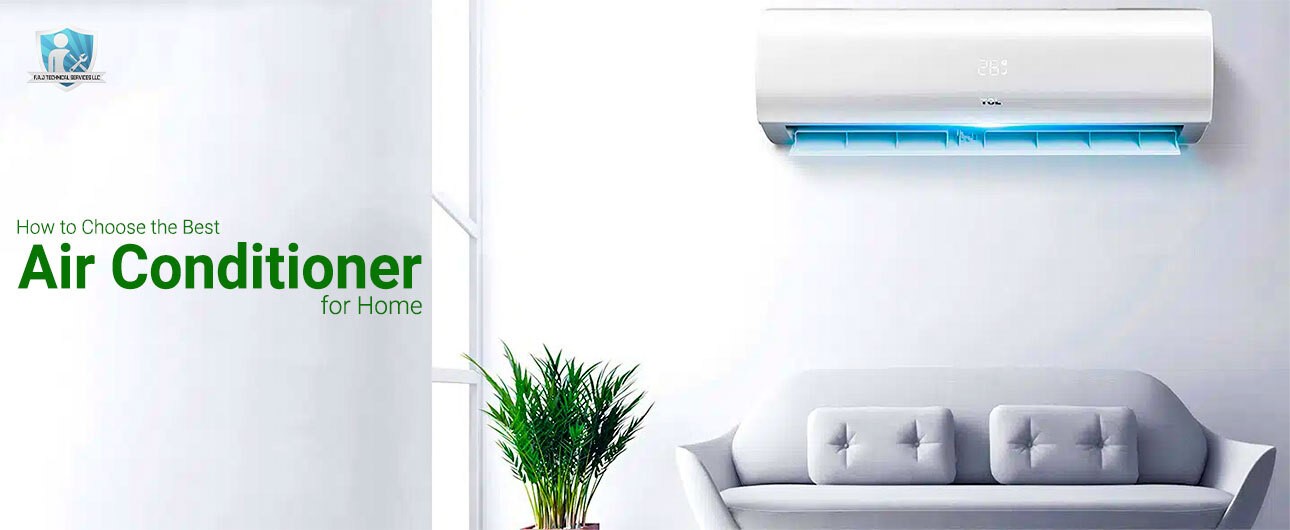Introduction
As the temperatures rise and summer approaches, the desire for a cool and comfortable escape within your home intensifies. Air conditioning offers a seemingly simple solution—a flick of a switch and instant relief from the heat. However, choosing incorrectly can result in a double blow.
Choosing the wrong air conditioner can make it difficult to cool your home, leaving you feeling hot and frustrated. Additionally, it can cause your energy bills to increase because it doesn't work efficiently.
This guide offers many options to help you make a well-informed decision, focusing on efficiency, effectiveness, and comfort.
Read More: How to Set AC Temperature to Save Energy and Stay Cool
Assessing Your Cooling Needs: Best AC for Home
Before comparing air conditioners, consider what you need to stay cool. This crucial first step ensures you choose the Best One for your Home, maximizing comfort and efficiency.
Key factors include room size, insulation levels, ceiling height, and local climate. Each factor significantly determines the cooling capacity required to achieve and maintain your desired comfort level.
Knowing your living space well is important. It helps you choose the right Air Con unit. The right unit cools efficiently without wasting energy, preventing trouble cooling the area.
According to research statistics by Energy Star, “An improperly sized AC unit can waste up to 30% of its cooling potential.”
4 Factors for Choosing the Perfect AC
1. Room Dimensions
This might seem obvious, but knowing the exact length, width, and height of the rooms you want to cool is crucial. By measuring your rooms, you ensure your chosen AC can cool the entire space effectively.
2. Insulation
Insulated homes require less cooling because the AC doesn't have to work as hard against outside heat. As a result, the AC system doesn't need to use as much power to maintain a comfortable temperature.
This can lead to lower energy bills and a more efficient cooling system. Conversely, poorly insulated homes lose cool air more quickly, requiring a more powerful AC to maintain comfort.
3 Ceiling Height
This might not be the first thing that comes to mind, but ceiling height plays a role in air circulation. Cathedral ceilings are grand but create a larger volume of air to cool. Standard air conditioners need help to circulate cool air effectively throughout such an ample space. In these cases, a more powerful AC unit with better airflow capabilities might be necessary.
4 Local Climate
Areas with scorching summers experience far more extreme heat than regions with mild summers. You'll need an AC unit with a higher cooling capacity to keep your home cool during those intense heat waves.
Consider the above key factors before buying an AC for your home. This will help you move forward confidently, and you will know that the chosen AC unit is perfect for your cooling needs.
The National Air Duct Cleaners Association (NADCA) advises homeowners to consider various factors when selecting an air conditioning system, such as square footage, insulation levels, and climate.
Pick the Right Type of AC Unit
Understanding the different types of air conditioners is essential when choosing one. There are different types of air conditioners, each with its own advantages. Portable units, split-system air conditioners, and ductless mini-split systems suit different spaces.
As per FAJ Professional HVAC Experts Insight: "Split-system air conditioners are often preferred for their efficiency and quiet operation, making them ideal for larger homes or multiple rooms. However, portable units offer flexibility and ease of installation, making them suitable for smaller spaces or renters."
Here's a breakdown of common choices:
Portable AC Units
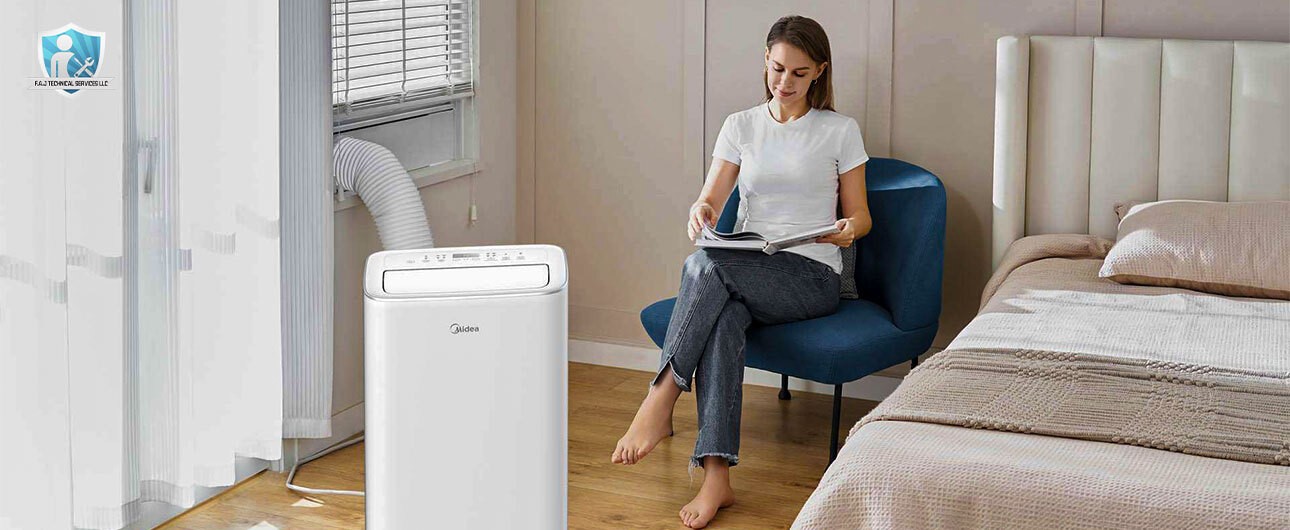
These self-contained units are ideal for small spaces or temporary cooling needs. They are easy to install and require only a window vent for exhaust. However, portable units are less powerful and energy-efficient than other options.
Window AC Units
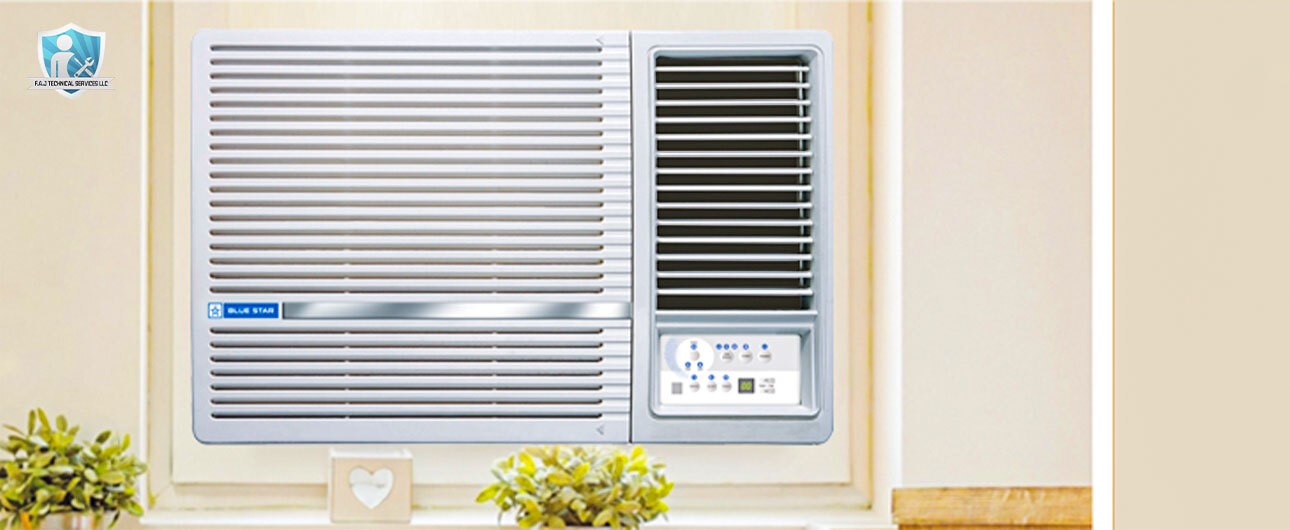
Window air conditioners are like portable ones. They install them in a window and expel warm air outside. Portable air conditioners can cool more than window ones, but they can’t cool a lot. Window air conditioners can be loud and might block your view from the window.
Split-System AC
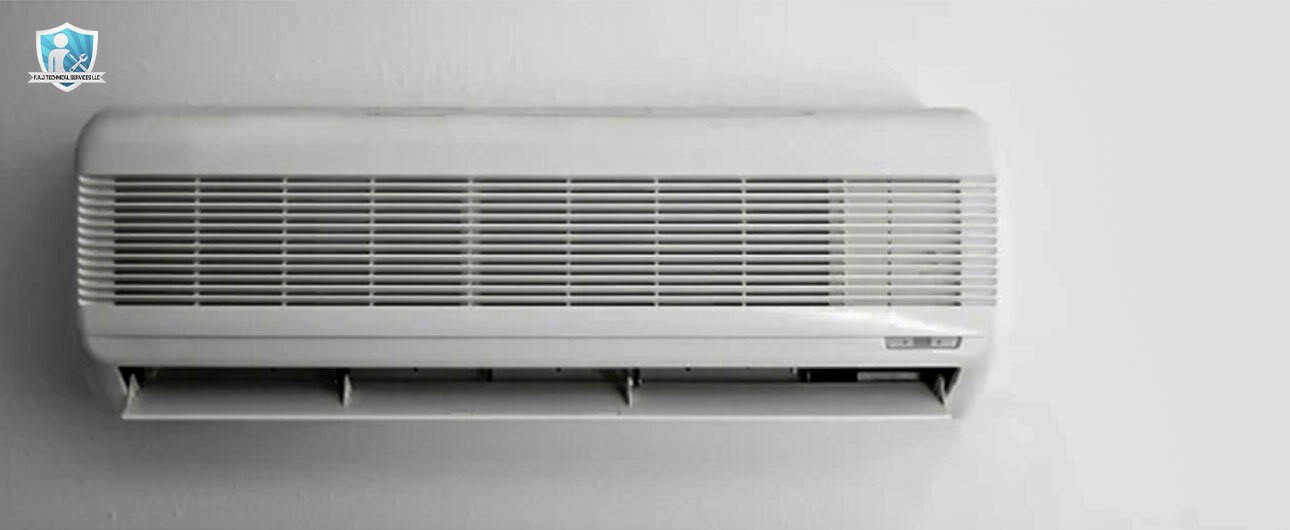
Split systems offer efficient cooling for larger homes or multiple rooms. They are quieter than window units and allow for more flexible placement indoors.
Ductless Mini-Split Systems
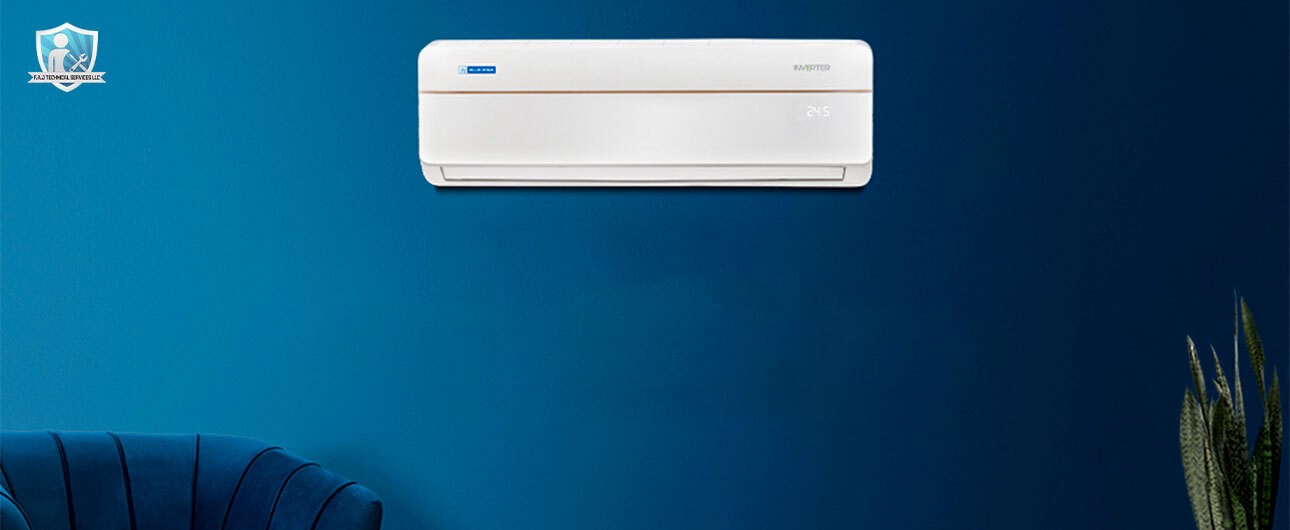
Unlike split systems, ductless mini-splits have separate outdoor and indoor units. However, they use refrigerant lines to connect the units instead of ducts. This makes them ideal for homes without existing ductwork and allows targeted cooling in specific rooms.
|
Feature |
Portable AC |
Window AC |
Split-System AC |
Ductless Mini-Split |
|---|---|---|---|---|
|
Cooling Capacity |
Low |
Moderate |
High |
High (Zoned Cooling) |
|
Installation |
Easy (DIY) |
Easy (DIY) |
Professional |
Professional |
|
Cost (Upfront) |
Low |
Moderate |
High |
High |
|
Cost (Running) |
High (Less Efficient) |
Moderate |
Low (Very Efficient) |
Low (Very Efficient) |
|
Noise Level |
High |
High |
Low |
Low |
|
Placement Flexibility |
Limited (Requires Vent) |
Limited (Window) |
Flexible |
Flexible (Indoor Units) |
|
Aesthetics |
Less Appealing |
Blocks Window |
Discreet Outdoor Unit |
Indoor Units on Walls |
|
Suitability |
Small Spaces, Temporary Needs |
Small-Medium Spaces |
Large Homes, Multiple Rooms |
Targeted Cooling, No Ducts |
Which Type of AC is Best for Your Home?
- Portable AC: Ideal for small spaces and temporary needs, but consider limitations.
- Window AC: Suitable for small to medium spaces and budget-conscious buyers.
- Split-System AC: Perfect for large homes prioritizing efficiency and quiet operation.
- Ductless Mini-Split: It is ideal for area-specific cooling and residences without ductwork.
Remember, the best AC unit for your home is the one that best addresses your specific needs and priorities. Before deciding, consider factors like space size, cooling requirements, budget, and installation preferences.
5 Tips for Choosing the Best Air Conditioner for Home
Prioritizing Energy Efficiency
Energy efficiency is not just a crucial consideration when selecting an air conditioner; it's our responsibility. It reduces electricity bills and minimizes environmental impact. Look for units that have high SEER (Seasonal Energy Efficiency Ratio) ratings, as this signifies excellent energy efficiency. As highlighted by Energy Star, “a 1 degree Fahrenheit increase in indoor temperature can lead to a 3% rise in energy consumption for cooling."
Additionally, variable-speed compressors and programmable thermostats can optimize energy usage and enhance efficiency.
Expert Insight: "Investing in an energy-efficient air conditioner saves money on utility bills and contributes to environmental sustainability. Look for units with ENERGY STAR certification and high SEER ratings for maximum efficiency." - Energy Efficiency Consultant.
Setting Your Budget
When choosing an air conditioner for your home, create a budget. This budget should cover upfront, installation, and long-term operational costs. Considering all these factors is important to ensure you choose the right air conditioner.
While energy-efficient models may have higher upfront costs, they offer significant savings on utility bills over time. Balancing upfront costs and long-term savings is a smart financial move that maximizes the value of your investment.
Expert Insight: "When setting a budget for your air conditioner, consider the upfront costs and the long-term savings on energy bills. Investing in a higher-quality, energy-efficient unit may result in lower overall costs over the appliance's lifespan." - Financial Advisor.
Researching Brands and Models
Researching reputable brands and models is crucial to finding the best air conditioner. Consider warranty coverage, customer reviews, and service availability when comparing options. Seeking recommendations from technicians or experienced homeowners can provide valuable insights into the performance and reliability of different models.
Expert Insight: "When researching air conditioner brands and models, it's important to consider factors such as warranty coverage and customer reviews. Look for brands with a reputation for reliability and excellent customer service to ensure a positive experience." - Product Reviewer.
Evaluating Additional Features
Beyond basic cooling capabilities, exploring additional features can enhance comfort and convenience in your home. Better air filters make the air inside cleaner, which helps people with allergies. Plus, you can control these systems from far away and save energy with smart home technology.
Expert Insight: "Features like advanced filtration systems and smart home compatibility offer added convenience and comfort. Additionally, considering factors like noise levels and ease of maintenance can further enhance your overall experience with the air conditioner." - Indoor Air Quality Specialist.
Seeking Professional Advice
Consulting with HVAC professionals is beneficial and invaluable for assessing your home's cooling needs and receiving personalized recommendations. Professional installation is also important for ensuring your air conditioner's optimal performance, efficiency, and longevity.
When considering professional HVAC services, we highly recommend choosing FAJ Technical Services L.L.C.
FAJ Technical Services L.L.C. guarantees high-quality services for installing, maintaining, and repairing air conditioning systems. They aim to meet all your air conditioning needs and ensure the proper installation of your system.
We also provide regular maintenance to keep it running efficiently. We are here to help with top-quality service if your system needs repairs. Trust in FAJ Technical Services for reliable and efficient solutions to keep your home comfortable year-round.
Expert Insight: "Professional installation by experienced technicians is critical for ensuring proper operation and efficiency of your air conditioner. Regular maintenance and servicing further prolong the unit's lifespan and prevent costly repairs." - HVAC Technician at FAJ Technical Services LLC.
Conclusion
Selecting the best air conditioner for home requires careful consideration of various factors, including cooling needs, energy efficiency, budget, and additional features. By evaluating these aspects and consulting with experts, homeowners can ensure their living spaces are cool and comfortable.
For lasting benefits from your air conditioner, prioritize energy-efficient models. Research reputable brands and consider professional installation to ensure it works efficiently.
In this regard, you should contact FAJ Technical Services for AC services. They have a good reputation for providing quality services. This way, you can save money in the long run and enjoy a comfortable home.
As the Air Conditioning Contractors of America (ACCA) highlighted, "Choosing the right air conditioner involves a balance of factors, including cooling capacity, energy efficiency, and budget considerations. By taking a comprehensive approach and seeking expert guidance, homeowners can make informed decisions that optimize comfort and savings."
How to Choose Air Conditioner FAQs
Q. Which type of AC is best for a home?
A: The best type of air conditioner depends on the room size, specific cooling needs, and budget:- Portable ACs are good for small rooms.
- Window ACs fit small to medium rooms.
- Split-System ACs are suitable for larger homes.
- Ductless Mini-Splits are best for targeted cooling in homes without ducts.
